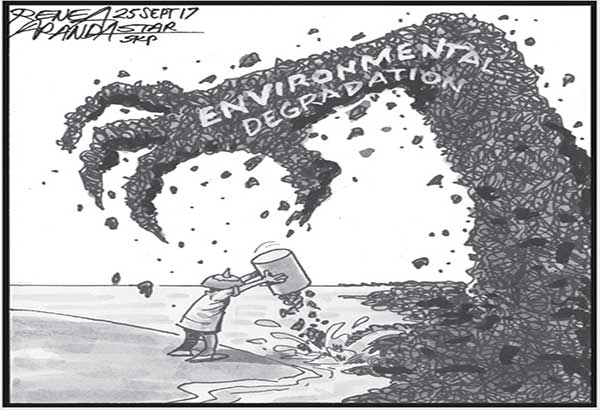EDITORIAL - Big polluter

Poor people can afford to buy food and other items only in small quantities. And even among those who can afford to buy in bulk, there are also many who prefer to consume in small quantities. Manufacturers have responded to this demand by offering their items in small packages.
Those sachets have seen commercial success especially in developing countries such as the Philippines. The downside is that the empty sachets are easy to discard indiscriminately. Environmental group Greenpeace has ranked the Philippines as the third worst polluter of the world’s oceans, after China and Indonesia.
The problem here is waste management rather than the use of packaging material. You can’t put potato chips and 3-in-1 coffee in sachet-sized banana leaves. The most durable paper deteriorates in storage.
Protecting the environment is not a simple battle. Saving one species can threaten others. Vast tracts of grazing areas can aggravate global warming because of the methane produced by cattle. Banning plastic bags did not compel the majority of shoppers to bring along reusable bags. Instead the bags have been replaced by thick or double-layer paper bags, often with the products wrapped in “labo” or membrane-thin plastic because the paper easily falls apart. And guess where paper comes from? Trees.
Players in the plastics industry have stressed that they recycle plastic products, especially for use in construction. To reduce ocean waste, which includes all types of garbage including not just plastic products but also tin cans, bottles and, yes, discarded paper, there must be a general improvement in waste management.
The most critical element is public attitude, which sees nothing wrong with indiscriminate garbage disposal. This is aggravated by the failure to enforce long-existing laws and ordinances against littering. People discard used tissue paper, candy wrappers, cigarette butts and half-eaten sandwiches anywhere, even tossing them out of moving vehicles. In informal settlements, residents see the streets and waterways as a giant public dump and sewer. Many of those waterways are connected to rivers that wash out into the sea.
The government, particularly local units, can design incentives to encourage proper waste disposal and recycling at the community or household level. Such programs have been tried before, but perhaps better incentives combined with the certainty of being penalized for littering can improve the chances of success. People must be made to understand that there’s a price to pay for filthy habits.
- Latest
- Trending




























